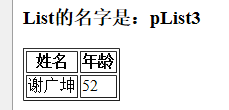java map在JSTL EL中的小应用--<c:forEach>遍历Map
准备数据
1 /** 结构示意图: 2 类型: List集合 map对象 LIst集合 Person类对象 String name ; int age 3 4 5 mList -> map() ->pList ->Person p1 坤哥 24 6 ->Person p2 鲲哥 104 7 ->pList2 8 ->Person ps1 王小三 24 9 ->Person ps2 王小二 24 10 -> map2() 11 ->pList3 12 ->Person pr1 张咪咪 19 13 ->Person pr2 赵咪咪 21 14 - >pList4 15 ->Person pd1 谢广坤 54 16 ->Person pd2 赵四 56 (可能是吧) 17 */
Map所需包 (只限JSTL中)
java.util.HashMap
java.util.Map
常 见 Map 指 令 清 单
1. 创建map
Map<String,List<Person>> map = new HashMap<String,List<Person>>();
List<Map<String,List<Person>>> mList = new ArrayList<Map<String,List<Person>>>();
其实结构确实不难的。(O - O)```
2. map添加数据
map.put("谢广坤",54)
3. 获取key
map.keySet() 和 map.entrySet()
本处用keySet()。因为我菜,用entrySet()遍历的数据不太正常,哪天解决了再写吧。
4. 获取value
map.values() 注意 ‘ s ’
我 的 主 要 代 码
1. 数据准备
//以谢广坤为例 List<Person> pList4 = new ArrayList<Person>(); Person pd1 = new Person("谢广坤",54); Person pd2 = new Person("赵四",56); pList4.add(pd1);pList4.add(pd2); //。。。 Map<String,List<Person>> map2 = new HashMap<String,List<Person>>(); map2.put("pList4",pList4); //。。。 List<Map<String,List<Person>>> mList = new ArrayList<Map<String,List<Person>>>(); mList.add(map2);
2. 输出所有数据
<c:forEach items="${mList}" var="m" varStatus="id"> <h2>第${id.count}个map</h2> <c:forEach items="${m.keySet()}" var="k"> <h3>List的名字是:<c:out value="${k}"></c:out></h3> <c:forEach items="${m.values()}" var="l"> <c:forEach items="${l}" var="p"> <table border="1px dotted blue"> <tr> <th>姓名</th> <th>年龄</th> </tr> <tr> <td>${p.name}</td> <td>${p.age}</td> </tr> </table> <br> </c:forEach> </c:forEach> </c:forEach> </c:forEach>
3. 输出年龄大于50的乡村爱情人物
<c:forEach items="${mList}" var="m"> <c:forEach items="${m.values()}" var="l"> <c:forEach items="${l}" var="p"> <c:if test="${p.age>50}"> <table border="2px dotted blue"> <tr> <th>姓名</th> <th>年龄</th> </tr> <tr> <td>${p.name}</td> <td>${p.age}</td> </tr> </table> </c:if> </c:forEach> </c:forEach> </c:forEach>
结 果 样 子
大概就是这个样子



